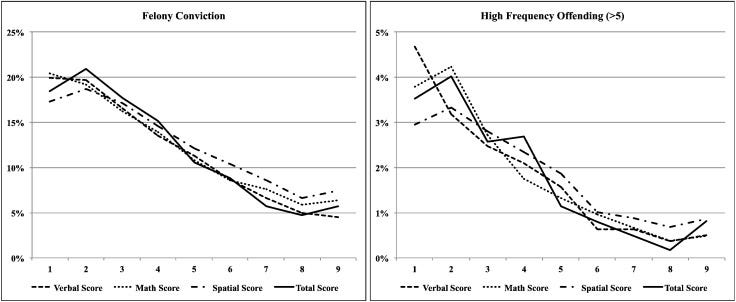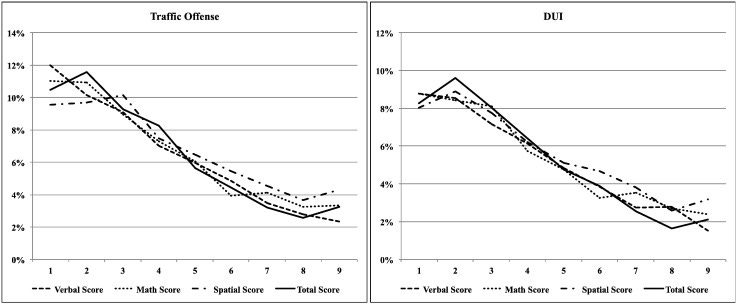Smarter People Commit Less Crime
What 20,000 Finns tell us about IQ and offending

In Case You Missed It…
[C]ognitive ability is an important correlate of individual differences in criminal offending, a finding that criminological theories ignore at their own peril.
Why do some people lead lives of crime while others never so much as steal a paperclip from the office? Poverty, peers, and personality presumably all play a part. But one factor stands head and shoulders above all of these: intelligence.
Decades of research show that, along with biological sex, IQ is one of the strongest predictors of criminal behavior. People with lower IQs are more likely to offend than their higher IQ peers.
But how linear is the IQ-crime relationship? That is, does higher IQ predict lower crime right across the IQ scale? And is it IQ per se that matters, or a subcomponent such as verbal IQ?
These are the questions addressed in an important 2015 study by Joseph Schwartz and colleagues. The study was based on a dataset of more than 20,000 Finnish men: nearly the entire male cohort born in 1987. The key variables were the men’s IQs (measured during compulsory military service, hence the all-male sample), and their criminal records between ages 15 and 21.
The graphs below show the main findings. As you can see, the IQ-crime relationship was close to linear: The higher the IQ, the lower the odds of offending. This held across every one of a range of crime categories. And it also held across all IQ subscales, suggesting that general intelligence is the main driver of the IQ-crime association.
Notice that, although the pattern is largely linear, it’s not perfectly so. At the extremes, the IQ-crime relationship gets a little murky. People with the lowest IQs often engaged in slightly less crime than those on the next rung up. Meanwhile, the declining-crime trend seemed to plateau, or even slightly reverse, at the highest IQ levels. Still, these are modest deviations from a largely linear trend.
One question I’m always asked when discussing these findings is this: Are smarter people really more law-abiding, or are they just better at covering their tracks? It’s a reasonable question, and some evidence suggests that higher-IQ criminals are indeed better at evading arrest than their less intellectually gifted colleagues. But that doesn’t explain the pattern in full. The main reason higher IQ individuals less often show up in crime statistics is that they less often commit crimes in the first place.
Why might that be? Several factors likely contribute. One is that intelligence equips people with greater self-control. Another is that smarter people tend to be better at anticipating long-term consequences and weighing them against short-term gains. And a third is that smarter people typically have more opportunities in life, which makes crime a less tempting option. Crime, after all, is often a crude solution to problems that high-IQ individuals can solve by other means.
Boosting everyone’s IQ isn’t a realistic crime-prevention strategy just yet. But the evidence is clear: When it comes to crime and punishment, intelligence matters. A lot.
You can access Schwartz and co.’s paper here or request a free copy here.
For more posts in my “Smarter People” series, click here.
Follow me on Twitter/X for more psychology, evolution, and science.
Coming Soon to The Nature-Nurture-Nietzsche Newsletter…
Six More Myths About Gender, Race, and Inequality (check out the first six here)
The Problem of Free Will, Part 2 (check out part 1 here)
12 Things Everyone Should Know About Evolutionary Theory (check out the rest of the “12 Things Everyone Should Know” series here)
How You Can Support the Newsletter
This post was free to read for all. If you like what I’m doing with The Nature-Nurture-Nietzsche Newsletter, and want to support my work, there are several ways you can do it.
Like and Restack: Click the buttons at the top or bottom of the page to boost the post’s visibility on Substack.
Share: Send the post to friends or share it on social media.
Upgrade to Paid: A paid subscription gets you:
Give a Gift Subscription: If you know someone who’d enjoy full access to The Nature-Nurture-Nietzsche Newsletter, consider giving them a gift subscription.
If you could do any of the above, I’d be hugely grateful. The support of readers like you helps keep the newsletter going and growing.
Thank you!
Steve






If I'm reading this correctly, the study looks at crime statistics in males between ages 15 and 21? I wonder how linear the relationship would be in older males, at ages 25 or 30 when executive function skills are more fully developed?
Do you think smart people commit less crime statistically because they are simply "better"? Or is there something we’re missing?
How much of a difference can be attributed to the ability to avoid getting caught? Could intelligence be correlated with certain types of crimes? For example, are there fewer crimes associated with impulsivity and more crimes that don’t require direct involvement (e.g., white-collar crime), which are more difficult to detect? Are people with higher IQs morally superior? And if so, why?